Fantasy Books
The Chaos Weaver - Book Review
 The Chaos Weaver (The Chaos Chronicles #1)by Aubrey Winters
The Chaos Weaver (The Chaos Chronicles #1)by Aubrey WintersWhat is it about:A dragon took my brother.I’m going to get him back.
My entire world changes when a scheme-gone-wrong results in my brother being taken by a dragon.
I’ve followed them into a strange and dangerous world filled with magic and enemies, but its handsome king has promised to help me hone powers I never knew I had.
Can he help me find my brother, or will I lose my heart—and everything I ever knew—in the process?
What did I think of it:So on social media the author was giving people the opportunity to sign up for an Advance Reader Copy. At her mention of necromancy and a mysterious king, I immediately signed up. And I got an ARC!
This is a really cool read!
I loved Everly from the start. She and her twin brother had a bad start in life and are surviving by conning people and stealing. I didn't really like her brother, but to Everly he is the world. So I could understand she follows and wants to do anything to get him back when a dragon drags him off to another world.
I really enjoyed getting to know this other world together with Everly. She immediately lands in trouble, manages to get out of it, to fall in the next mess. At times she is a bit too trusting, but as the world she landed in has very different rules and she's on her own for the first time in her life, I could understand .
And then there's the mysterious king!
Without giving away too much I can tell you he was my favorite character (although long time blog followers might be fearing for his life now, I know I do).
The ending although not a complete cliffhanger was exciting, leaving lots of questions, and made me hungry for more!
I might need to get this in print when it releases (ebook releases January 31st, go preorder!), and I already got a book from another series by this author to try soon.
Why should you read it:Necromancy and a Mysterious King!Need I say more?!
Review: A Letter to the Luminous Deep by Sylvie Cathrall

Buy A Letter to the Luminous Deep
OFFICIAL AUTHOR BIO: Sylvie Cathrall writes stories of hope and healing with healthy doses of wonder and whimsy. She holds a graduate degree in odd Victorian art and has handled more than a few nineteenth-century letters (with great care). Sylvie married her former pen pal and lives in the mountains, where she dresses impractically and dreams of the sea.
FORMAT/INFO: A Letter to the Luminous Deep was published by Orbit Books on April 25th, 2024. It is available in paperback, ebook, and audiobook formats.
OVERVIEW/ANALYSIS: One year ago, a disaster struck the underwater residence known as the Deep House, leaving its two inhabitants, E. and Henerey, presumed dead. After a year of grieving, E.'s sister Sophy and Henerey's brother Vyerin begin to investigate the events that led to their siblings' death. Sifting through correspondence between the many individuals involved, the two begin to uncover a much more ominous mystery than they expected.
A Letter to the Luminous Deep is a charming underwater tale that ultimately dragged too much to keep me hooked. This is a very slow-paced affair, told largely through letters written in the style of the late 1800s. This is certainly a difficult form of novel to pull off. For one, there are occasional moments where the author has to do some narrative contortions to explain why certain events or conversations were put to paper. While I understand the necessity in order to convey certain key information to the reader, it does strain the credulity a bit in some places.
That said, there were also numerous ways the narrative structure worked. I did enjoy the subtle ominous foreboding that builds up over the course of the story. Certain innocuous observations of things that are "off" in the world begin to create an unsettling pattern, especially as we have a rough idea of how events end. Several people each have a piece of the puzzle, but it's only in assembling those pieces by collecting these letters that they (and the audience) start to see the whole picture.
I also liked the slow romance between the two characters of E. and Henerey. Each is a shy or reticent person for various reasons. Through the letters, however, we can see two people being understood in a way they haven't before. The use of aborted "first drafts" of letters also lets us see a little glimpse of their respective nervousness as they try to fumble through how to address a person they've developed feelings for, even though they've never met in person.
The author has also built up a fascinating maritime culture. Some calamity 1000 years ago left this fantasy world with minimal inhabitable land. As a result, whole peoples live one boats or floating collectives. As our focus in this story is on the colleges and scholarly life of these people, most of the details do remain frustratingly out of sight, but perhaps not unreasonably. The people writing the letters are focused on their own narrow slice of life, not on the workings of society as a whole.
CONCLUSION: While I did enjoy my read of A Letter to the Luminous Deep overall, I found it struggled to hold my attention towards the end. The narrative structure of letters just dragged events out. We have a good idea of what happened some thirty pages or so before the ending, with the rest of the characters trying to catch up through their long-winded missives. As someone who struggles with slow books, ultimately this just didn't click for me. While the set up for part two of the duology is intriguing, this tale simply isn't my cup of tea.
How to Survive “Interesting” Times
 Image by Ervin Gjata from Pixabay
Image by Ervin Gjata from Pixabay
Good afterevenmorn (or whenever you’re reading this)!
Welp, what a start to 2025. Personally, it hasn’t been great. I kicked off the year very ill (thanks, Covid), languishing in bed wondering if this was the moment I drown without ever touching water. ‘Twas not pretty. Looking wider, the world appears to be literally on fire, or underwater, or deliberately reduced to rubble. It’s not been a good time for a whole lot of folks. I have been taking care of myself by largely staying off social media (sorry if I was missed. But I was already overwhelmed and unable to cope with my own busy-ness, let alone the worries of the world at large), and engaging in art. Not creating physically, as I’ve been very unwell, but consuming, art. Okay, I’ve been watching lots of Chinese dramas (some of which I don’t remember because I was in a feverish haze). That still counts, though.
I’ve also been daydreaming a lot, which is usually the important first step in my creative process. I have a new book in my head. All I need to do is finish the book I’m working on now, and then sit down and draw out this story word by word. I expect that it will become my next free online serial.
Though I’m sick… again (not Covid this time, just an annoying flu)… I’m in a much better place, coping-wise. And I owe that to art.
 Some art, to cheer up the page.
Some art, to cheer up the page.
It has been a recent (or not so recent, depending on your perspective) trend toward denigrating the arts; removing funding for it, making absurd claims that those who provide it should not be properly compensated, or ignoring complete just how important the arts are and how much we rely upon them.
Think about it.
What usually happens when we’ve had a rough day? Most folks will go home, mix themselves a drink, and then turn on the television, or fire up that console or gaming PC. Those shows that you watch? Art. Those games you play? Art. Someone wrote, blocked, shot, and edited those episodes/games. Actors and voice actors stepped in to fill those roles. Composers created the score. This is also true for those of us who turn to films to make us feel better. I often watch movies that make me cry when I’ve had a rough time. It helps me get the angst out (as I usually struggle to feel at all. Yay, depression!). Sometimes, I’m not in the mood to cry, so I’ll put on a really dumb action flick because explosions and absurd situations make me happy. Sometimes it’s to laugh at the movie. Sometimes it’s to experience the catharsis of evil getting what it deserves. We so infrequently see that in the real world.
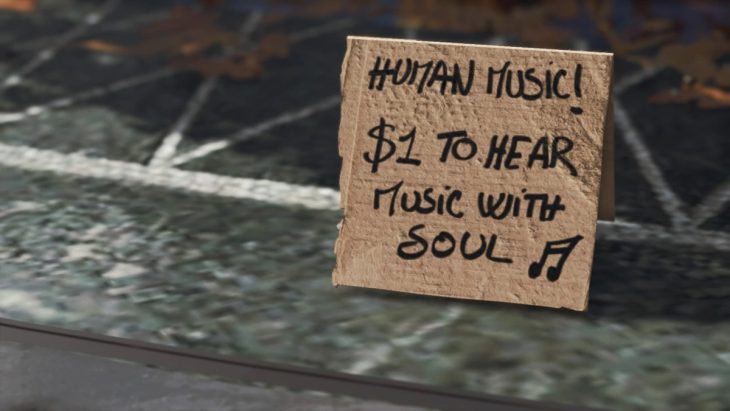 From the game Detroit Become Human – a fantastic exploration of AI what makes a person a person.
From the game Detroit Become Human – a fantastic exploration of AI what makes a person a person.
Television and film aren’t the only way we interact and lean on art.
I cannot tell you the number of times I have been struggling with, well, everything, and unable to find a way to express or clear it away. Then the right piece of music hits, and suddenly I’m a puddle on the floor, or my mind is hijacked and taken on a really impressive adventure. I lean on music a lot for coping with the world. It is even an incredibly important part of my writing process. I have crafted entire novels off a single song (the most recent example would be Skylark, which was written the moment I listened to a song, and then also with that one song on repeat for the three months it took to get that story out onto the page). I have listened to a song, and a critical scene plays out like a movie in my head, guided by the music. The most striking example is this song:
One day, if that story is ever published, I’ll let you all know which scene in particular this song engendered.
Books, of course, including audio books and comics, are other ways the arts create space for us. There are so many reasons and ways literature of all kinds can help. The simplest is a brief escape. I’m no longer me, sitting on the sofa, utterly destroyed by the state of the world. I’m a silent observer; part of adventuring party, or even the main character in another story. And in this story, however high the stakes may be, I am still safe on my sofa. It doesn’t matter what kind of escape. A low stakes, cozy read? Excellent escape. A dire, world-ending threat full of struggle and grief? Excellent escape (and also an opportunity to let those tears out at last). Escape is so important. It’s not forever. And it won’t solve the real-life problems for you.
 Image by Mystic Art Design from Pixabay
Image by Mystic Art Design from Pixabay
But rest is important. If you don’t have a rest day in your workout regime, your muscles will have not time heal, recover and grow. If you do not get adequate sleep, your cognitive function will be severely impacted. It’s no different for your mind/heart. If you don’t take a break from what is causing you distress, you’ll collapse beneath the weight of it all. It’s important to escape. Do it, and don’t feel guilty for it.
Literature also helps navigate terrible situations and scenarios for those of us who struggle with doing so in the real world. It helps give voice, using someone else’s words, to our experiences with enough separation that we remain safe. And sometimes, sometimes it can unlock the tings we need released in order to move forward. I have often been struggling with a completely separate grief, read a particularly tragic incident in a story that has nothing to do with whatever is weighing on me, and then cried. And cried. And cried. Not about the events in the book. But about the situation I’m facing. It’s just that the book helped unlocked the emotions that were trapped behind a dam I didn’t know I had built. Visual media has also helped with this; more with videogames than television shows or films of late, admittedly.
It’s no mistake that nearly all of us turn to the arts when things start going wrong. The arts are important and necessary.
So this is how you survive these interesting times. Consume art.
 Image by Jose Antonio Alba from Pixabay
Image by Jose Antonio Alba from Pixabay
And make it.
I know it’s incredibly difficult to create with the world literally on fire. Or if you’re sick in bed with all the energy of a sloth after a big meal. All the same, human beings are creators by nature. It doesn’t matter what art you create. Or if other people think that art is good. You don’t have to share it at all. It’s just for you. Just create.
That can mean something as simple as buying yourself a colouring book and going to town with crayons or pencils. Hell, even a ball-point pen will work if you’re in a pinch. Got some time between tasks at work? Doodle. Write a short poem. A piece of flash fiction. It doesn’t have to practical. It doesn’t have to be monetized. It does not have to appeal to anyone else. It’s just for you, unless you want otherwise.
If you want, share your art. But that is not required.
It is hard right now. It’s alright if you’re struggling to create. Lord knows, I am. Finding motivation is tough in the current clime. Sometimes I think that’s by design. If you’re too busy trying to stay afloat, how can you imagine anything better for yourself, your neighbours, or the world? So, if anger, frustration and rage is all you have left, use that. Create from that.
Create out of spite.
Create. Make it a giant middle finger to the people who are trying to hold you down, make it hard, steal your joy, stop you from imagining.
Create art. Consume art. It is good for your soul, and the world could use more soul, I feel.
And if you have the means, consider tossing a coin to your Witcher (artist), for their skills have kept the monsters at bay for a little while longer. And in a world full of monsters, that is not nothing.
When S.M. Carrière isn’t brutally killing your favorite characters, she spends her time teaching martial arts, live streaming video games, and cuddling her cat. In other words, she spends her time teaching others to kill, streaming her digital kills, and a cuddling furry murderer. Her most recent titles include Daughters of Britain, Skylark and Human. Her serial The New Haven Incident is free and goes up every Friday on her blog.
“Vanishing Treasures: A Bestiary of Extraordinary and Endangered Creatures” by Katherine Rundell
Dive into Vanishing Treasures, by Katherine Rundell, exploring the delicate balance between cultural heritage and…
The post “Vanishing Treasures: A Bestiary of Extraordinary and Endangered Creatures” by Katherine Rundell appeared first on LitStack.
Teaser Tuesdays - The Queen's Blade

Our realm, splintered and broken, yearned to be united under a single ruler. The Witches may have won and put one of their own on the throne, but even they had suffered.
(page 1, The Queen's Blade by Evelyn Ward)
---------
Teaser Tuesdays is a weekly bookish meme, previously hosted by MizB of Should Be Reading. Anyone can play along! Just do the following: - Grab your current read - Open to a random page - Share two (2) “teaser” sentences from somewhere on that page BE CAREFUL NOT TO INCLUDE SPOILERS! (make sure that what you share doesn’t give too much away! You don’t want to ruin the book for others!) - Share the title & author, too, so that other TT participants can add the book to their TBR Lists if they like your teasers!
THE FURY OF THE GODS by John Gwynne (The Bloodsworn #3)
Spotlight on “The Alchemist of Aleppo” by Marie K. Savage
The Alchemist of Aleppo bends the space-time continuum and embodies our fascination with what science…
The post Spotlight on “The Alchemist of Aleppo” by Marie K. Savage appeared first on LitStack.
Ten Things I Think I Think: January 2025
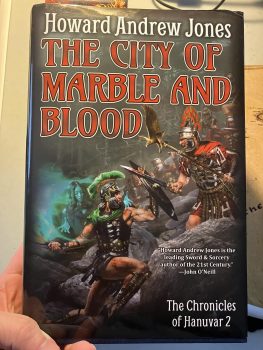 It’s been a whole month since I randomly shared my opinions on things I think How in the world have you made it through the start of this new year, without that????
It’s been a whole month since I randomly shared my opinions on things I think How in the world have you made it through the start of this new year, without that????
So, I think that:
1) THE CITY OF MARBLE AND BLOOD IS TERRIFIC
If you follow me on Facebook – or even read my column here every Monday, you know I’ve been talking about my Black Gate buddy Howard Andrew Jones, who passed away earlier this month. Click on over to see what I had to say last week about a really great guy.
I had not yet read Howard’s most recent trilogy, the Chronicles of Hanuvar. Howard’s Arabian fantasy mystery short stories featuring Dabir and Asim have been my favorites of his work (even more so than the two novels featuring the duo).
But man – this first book in the trilogy is his best work. Incorporating several short stories previously published, it’s very episodic in nature, which I liked. They’re linked together, making up Hanuvar’s ongoing quest, and the format keeps things moving. There’s no padding here.
While I have Robert E. Howard and Fritz Lieber on my shelves, I’m more an epic fantasy fan, ala JRR Tolkien, Terry Brooks, David Eddings, and Robert Jordan. I feel like Howard’s trilogy is epic sword and sorcery – a hybrid of the two which would also include Glen Cook’s The Black Company. It contains the individual adventuring aspect of sword and sorcery (stakes are more focused on the hero, not nations or empires), with the epic story scope of high fantasy. Howard’s trilogy is Epic Sword and Sorcery.
I finished Lord of a Shattered Land, put it on the Shelf, and immediately sat down and began The City of Marble and Blood. And boy, does something big happen by page twenty-five!! The latter two books are in traditional novel form. So be it – I’m in.
2) D&D NOVELS ARE STILL ENJOYABLEI used to own a bunch of the old D&D novels. Series’ such as Ravenloft, The Cleric Quintet, Dragon Lance, Forgotten Realms; dozens of them. I unloaded them during one of my periodic sell-offs over the years (I still have over 2,000 print books, but I’d love to have a lot of the ones which are gone. I still have the Gord the Rogue books, though!
I’ve written about The Temple of Elemental Evil and The Village of Hommlet more than once here at Black Gate. And right now, I’m listening to the audiobook of the ToEE. And it’s not bad.
If you’re looking for a quite D&D-like series, check out the Dhampir books by Rob and C.J. Hendee. They read a lot like a Dungeons and Dragons adventure.
3) JOHN MADDOX’ SPQR MYSTERIES ARE MY FAVESI have now listened to the first ten (of thirteen) of these mystery novels set in Ancient Rome, and I’ve talked about them in What I’ve Been Listening To. I have enjoyed every single of one of these, and John Lee is a PERFECT match as narrator. I can’t imagine anyone else voicing Decius Caecilius Matellus the Younger. I talked about it a little bit, here.
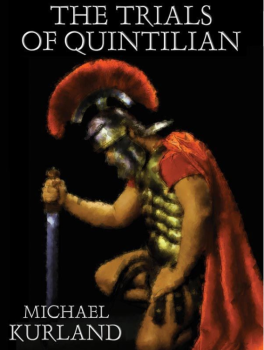 The cover itself is blurry – that wasn’t me!
4) YOU SHOULD CHECK OUT QUINTILIAN TOO
The cover itself is blurry – that wasn’t me!
4) YOU SHOULD CHECK OUT QUINTILIAN TOO
So, if you like SPQR, and you’re looking for more in that vein, check out Michael Kurland’s The Trials of Qunitilain. I’m a fan of Kurland’s Professor Moriarty novels. The Trials of Quintilian contain three stories that use the real-life Marcus Fabius Quintilianus as the hero.
He was an orator, rhetorician, barrister and educator. Here, he’s also essentially a private eye, gathering evidence for the client he is representing as a lawyer. I like the mix of PI and law, set in Ancient Rome. I picked up the ebook at a real steal, and it’s a fun, quick read. More old world Roman mystery stuff for me, please!
5) TOTAL WAR: WARHAMMER II KEEPS DRAWING ME BACKThere are a few games I reinstall every so often (sometimes a couple years apart), dive deep into, then move on. This – and WarHammer I, because combining them lets me play any faction from either game – is far and away my favorite RTS strategy game (it’s properly a hybrid, I think).
But man, I can sink hours upon hours into this. Often having to go back to a prior save and try a different path. While frustrating, it’s still kind of fun to try and make it work out. The first 10 – 15 turns for any faction are always hard for me, and I have a lot of false starts. I don’t actually fight the battles; I auto-resolve them. I like the city and troop building, and the strategies and faction relations. The fantasy aspect of WH makes this far and away my favorite.
They REALLY need to buy the Tolkien license and do TW: Middle Earth. THAT would be fantastic!! I cut my teeth on TW: Rome, and I suspect any Total War game in your interest area (Attila the Hun, Brittania, Egypt – whatever) would work for you. I’m not into Warhammer, but I do like this game.
6) NO WRITING PROJECT IS EVER BEYOND RESUMPTIONI haven’t been writing much lately, beyond my weekly column here (Note to self – quit playing TW: Warhammer II, then!!).
But last week I dusted off a project I started in 2011, and hadn’t worked on for quite a few years, I’m certain. But some real-life downs put me in a frame of mind where it was exactly what I needed to dive into. So, I’m almost done with the first draft of a Companion/Study Guide to Paul’s Letter to the Ephesians. It’s my favorite book of the Bible, and I plan on honing this guide to the sharpness of an obsidian blade.
I had to dig this off a recovered hard drive, it was so dusty. And though I abandoned it over a decade ago, it is thriving right now. No project – even no idea – is ‘dead’ unless you deem it so. And sometimes, an old one just might save you in more ways than one.
7) ANIMAL CONTROL AVOIDS BEING TOO DUMB FUNNYI only watched a couple episodes of Community, though I know about it. Star Joel McHale is the lead on Animal Control, which manages to stay on the side of being good dumb funny. It’s not clever dumb funny, like Galaxy Quest. But it’s not beyond stupid dumb funny, like Dumb and Dumber.
It’s not a thinking-heavy sitcom, but I like it pretty well. I am enjoying it more than Dennis Leary’s Going Dutch, which I haven’t given up on yet. However, Going Dutch doesn’t have much of any any depth to it, so we’ll see how long I can last.
8) I FAILED ON MY ANNUAL CHRISTMAS POST IDEAEvery Christmas (often Christmas Eve), I re-watch Humphrey Bogart’s ‘dark’ comedy, We’re No Angels. And every year, I observe that I really should write a Black Gate post on it. I’m 0 for every year on that. But hey – it’s a new year!!!
A terrific cast and light-hearted dark humor, it’s just about my favorite Christmas movie. Every time I see Peter Ustinov in this, I think that he would have made a good Dr. Watson back then. There was a modern remake (sort-of) with Robert DeNiro and Sean Penn. If that’s the only version you’ve seen, you really should go check out Bogie, Rathbone, and company.
9) I KINDA HAVE A NEW CHRISTMAS FAVE AS WELLThough it’s certainly not ‘new’ anymore, Jingle All the Way is about my favorite modern Christmas movie. It’s a silly (but not too dumb comedy with Ah-nuld Schwarzenegger, Sinbad, and a deliciously creepy Phil Hartman.
I think I’ve added Red One alongside Jingle, after watching it this year. When a Rock movie works, I really enjoy it, and this is like a Marvel-lite Rock Christmas movie. And that’s exactly what I want.
10) I LIKE ONE-OFF CHRISTMAS EPISODES FOR BRITISH TV SHOWSSome British mystery shows I watch, like The Cleaner, and Death in Paradise, air a new episode around Christmas day. I look forward to these now. I actually started a Death in Paradise re-watch after seeing the new Christmas episode (which featured ANOTHER cast change).
We’re talking 109 one-hour episodes, with multiple cast changes. We’re talking quite the investment. I’m almost through season five (of thirteen), and loving every episode. The ‘Christmas episode’ relit a fire. I wrote about the show some, here.
If you’ve seen episode one of season three (and you will absolutely know whether or not you have. A BIIIGGGG thing happened), I wrote an entire post on that one, earlier this month. Do NOT read it if you haven’t seen that episode. Trust me.
Prior Ten Things I Think I Think
Ten Things I Think I Think (December 2024)
Nine Things I Think I Think (October 2024)
Five More Things I Think: Marvel Edition (September 2024)
Ten Things I Think I Think: Marvel Edition ( September 2024)
Five Things I Think I Think (January 2024)
Seven Things I Think I Think (December 2023)
Talking Tolkien: TenThings I Think I Think (August 2023)
A (Black) Gat in the Hand: Ten Things I Think I think (August 2023)
5 More Things I Think (March 2023)
10 Things I Think I Think (March 2023)

Bob Byrne’s ‘A (Black) Gat in the Hand’ made its Black Gate debut in 2018 and has returned every summer since.
His ‘The Public Life of Sherlock Holmes’ column ran every Monday morning at Black Gate from March, 2014 through March, 2017. And he irregularly posts on Rex Stout’s gargantuan detective in ‘Nero Wolfe’s Brownstone.’ He is a member of the Praed Street Irregulars, founded www.SolarPons.com (the only website dedicated to the ‘Sherlock Holmes of Praed Street’).
He organized Black Gate’s award-nominated ‘Discovering Robert E. Howard’ series, as well as the award-winning ‘Hither Came Conan’ series. Which is now part of THE Definitive guide to Conan. He also organized 2023’s ‘Talking Tolkien.’
He has contributed stories to The MX Book of New Sherlock Holmes Stories — Parts III, IV, V, VI, XXI, and XXXIII.
He has written introductions for Steeger Books, and appeared in several magazines, including Black Mask, Sherlock Holmes Mystery Magazine, The Strand Magazine, and Sherlock Magazine.
Bonded in Death – J. D. Robb
 Bonded in Death Series: In Death #60
Bonded in Death Series: In Death #60 on July 30, 2025
His passport read Giovanni Rossi. But decades ago, during the Urban Wars, he was part of a small, secret organization called The Twelve. Responding to an urgent summons from an old compatriot, he landed in New York and eased into the waiting car. And died within minutes…
Lieutenant Eve Dallas finds the Rossi case frustrating. She’s got an elderly victim who’d just arrived from Rome; a widow who knows nothing about why he’d left; an as-yet unidentifiable weapon; and zero results on facial recognition. But when she finds a connection to the Urban Wars of the 2020s, she thinks Summerset―fiercely loyal, if somewhat grouchy, major-domo and the man who’d rescued her husband from the Dublin streets―may know something from his stint as a medic in Europe back then.
When Summerset learns of the crime, his shock and grief are clear―because, as he eventually reveals, he himself was one of The Twelve. It’s not a part of his past he likes to revisit. But now he must―not only to assist Eve’s investigation, but because a cryptic message from the killer has boasted that others of The Twelve have also died. Summerset is one of those who remain―and the murderous mission is yet to be fully accomplished…
GoodreadsPages: 400
Genres: Fiction / Crime, Fiction / Mystery & Detective / General, Fiction / Mystery & Detective / Police Procedural, Fiction / Mystery & Detective / Women Sleuths
Format: Audiobook
Source: NetGalley
ISBN: 9780349443362
Also in this series: Obsession in Death, Devoted in Death (In Death, #41), Down the Rabbit Hole (includes In Death, #41.5), Brotherhood in Death (In Death, #42), Purity in Death (In Death, #15), Apprentice in Death (In Death, #43), Secrets in Death (In Death, #45)
{ "@context":"https://schema.org", "@type":"Review", "datePublished": "2025-01-27T05:39:36+00:00", "description": "\nAnother great novel from J. D. Robb. \u00a0These books are one of a few series that I can enjoy hearing and not reading myself. \u00a0You will miss much of the story if you haven't read the previous boo", "publisher": { "@type": "Organization", "name": "Books In Brogan" }, "url": "https:\/\/booksinbrogan.com\/blog\/2025\/01\/26\/bonded-in-death-j-d-robb\/", "itemReviewed": { "@type": "Book", "name": "Bonded in Death", "author": { "@type": "Person", "name": "", "sameAs": "" }, "isbn": "9780349443362" }, "author": { "@type": "Person", "name": "Books In Brogan", "sameAs": "https:\/\/booksinbrogan.com\/" }, "reviewRating": { "@type": "Rating", "ratingValue": false, "bestRating": "5" } }
Another great novel from J. D. Robb. These books are one of a few series that I can enjoy hearing and not reading myself. You will miss much of the story if you haven’t read the previous books. The author usually writes books that may have a little back story but this one has a lot of links to previous books and you would need the previous book to solve the murder mystery.
An Eternal Champion’s Legacy: 64 Years After his Debut, Fantasy’s Original Edgelord Still Reigns Supreme
Paperback editions of the first six Elric books (DAW Books, 1972 – 1977). Covers by Michael Whelan
It may not seem like it, but this winter has given fans of fantasy plenty to celebrate. Less than a month ago, Michael Moorcock turned 84, his most recent Elric novel turned three, and the latest reprint of his vaunted Eternal Champion series hit store shelves in the US. Thanks to a boatload of new collections, there is no better time to be a fan of the pale emperor. Or, for that matter, to look into his legacy.
Suffice to say that Moorcock’s legendary career has been full of incredible characters. His influence can be seen among the finest rogues of the Sword Coast and in tales spun in the far-flung wine sinks of Essos. Nowhere is that more noticeable than with his most famous creation, Elric of Melnibone. When his early stories made their way into the hands readers in the 60s and 70s, the impact would prove seismic. Today those same readers are academics, authors, and gamers happy to see Elric influence another generation.
[Click the images for Champion versions.]
“It stuck out from any other fantasy book I’d read,” Derik Petrey shared the moment Elric of Melnibone was brought up.
The Chair of Humanities at Sinclair Community College recalls that first encounter with the emperor of dragon isle vividly. Like so many other readers in the 80s, Moorcock’s style and characters proved as addictive Imrryr’s dream couches.
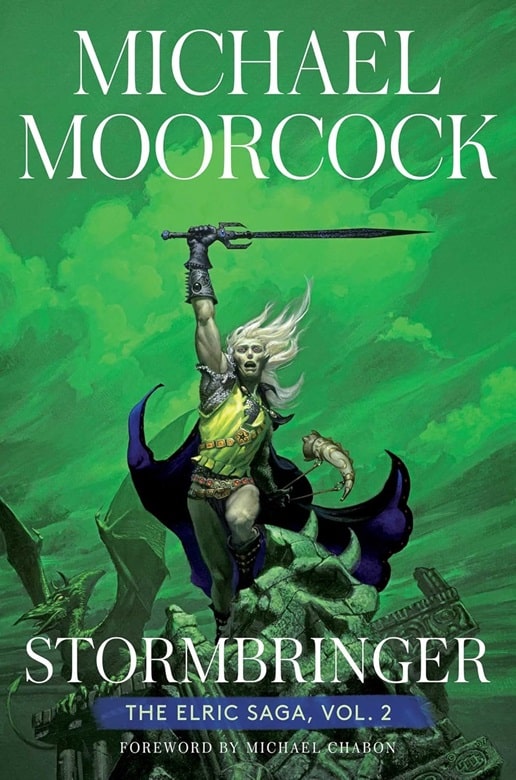
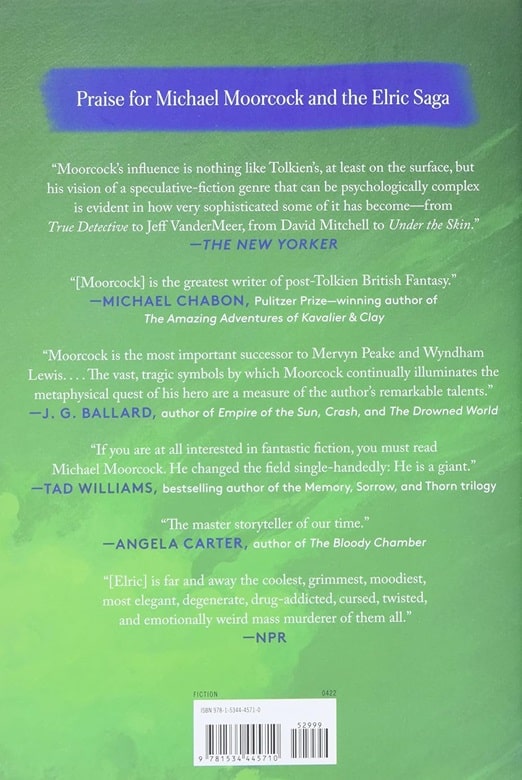
The Elric Saga, Volume 2: Stormbringer , an omnibus containing the novels
Stormbringer (1965), The Vanishing Tower (1977), The Bane of the Black Sword (1977),
and The Revenge of the Rose (1991). Saga Press, April 12, 2022. Cover by Michael Whelan
“He was really the first antihero that I’d read and could wrap my head around. There was this sense that ‘oh this person has all sorts of flaws.’ He’s addicted to drugs, longs to marry his cousin, and keep her from her brother,” Petrey remembered.
The years 1983-1984 would see him read Elric of Melnibone and The Sailor on the Seas of Fate. In an age where the works of JRR Tolkien and CS Lewis were the example other authors followed, Moorcock became a patron saint of literary rebels.
“He (Elric) did not have the values of a Tolkien-esque character. You have his dependency on a sword, a living weapon, and also this love-hate relationship with Arioch that was really uncommon.”
Sci-fi fans of Petrey’s vintage look around and see a landscape transformed by the pale swordsman. Other Eternal Champions were great characters, but to Petrey, neither Corum, Dorion Hawkmoon, or any of the others held a candle to Elric.
“It was very much conveyed to me that this was a non-human civilization. It’s this idea of how you communicate how different a society would be,” Petrey said. “There were very few science fiction writers that treated aliens as truly alien. You had Jack Vance, Larry Niven, and Moorcock.”
Elric’s modern-day revival speaks to the enduring power of Moorcock’s writing. Recent years have seen entirely new generations of readers take to the original White Wolf of Fantasy.
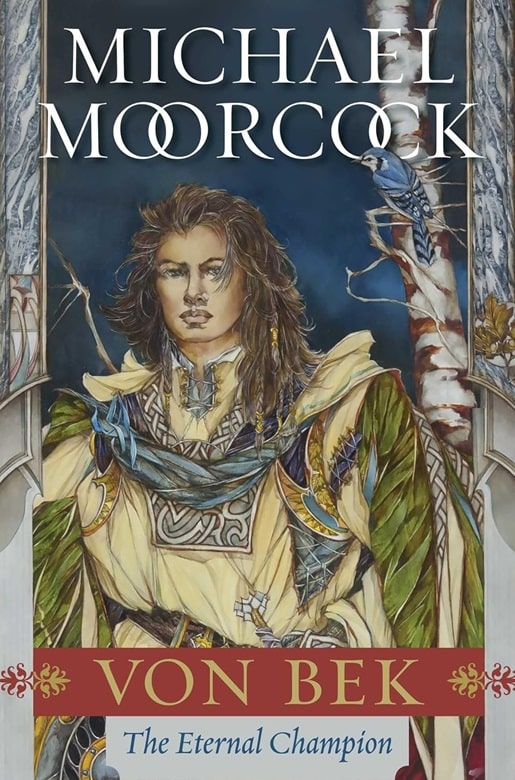

Von Bek: The Eternal Champion omnibus, containing The Warhound and the World’s Pain
and The City in the Autumn Stars (Saga Press, December 3, 2024). Cover by Tom Canty
It wasn’t so long ago that simply finding certain editions of the Elric saga were a challenge. The number of anthologies, collections, and iterations of his stories can be staggering. Untangling the publication history of Elric for this article left me bewildered at times. Without the recent wave of reprints, reading those stories would be just as much of a challenge.
That would change in 2022. Starting in Feb. of that year, Saga Press announced they would be releasing new collections of Moorcock’s work starting with the Kinslayer himself. Last December, fellow Eternal Champion Von Bek received the same loving treatment when The Warhound and The World’s Pain returned to bookshelves. The well-made collections have made the jobs of Booktubers peddling the proverbial Book of Elric that much easier.
“I think Elric’s sustained popularity over more than 60 years owes much to Moorcock’s transgressive bent. He upended, or amplified beyond convention, traditional tropes of speculative fiction, including the monomyth (the hero’s journey),” Bridger, from the Library Ladder YouTube channel, shared by email.
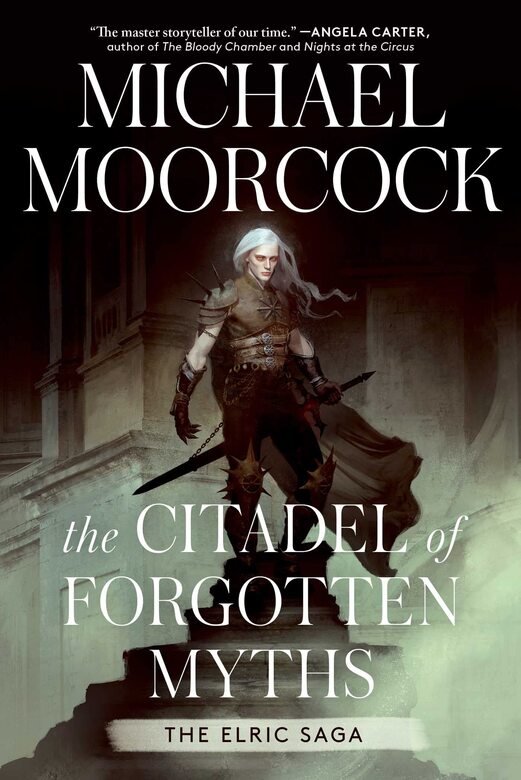
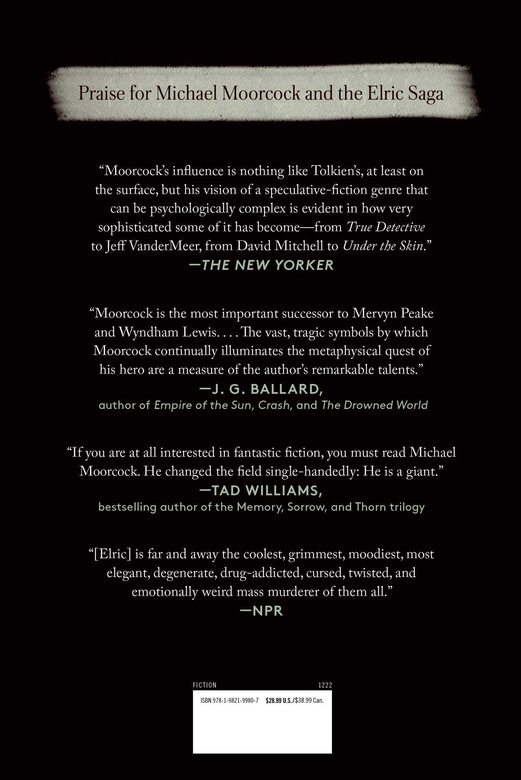
The Elric Saga: Citadel of Forgotten Myths (Saga Press, December 6, 2022). Cover by Bastien Lecouffe-Deharme
He is one of many helping introduce Elric and his fellow champions to readers online. His four Moorcock-specific videos alone have garnered over 160,000 views.
At just 12, he would begin his journey alongside Imrryr’s most famous citizen with the DAW paperback editions, with their beautiful Michael Whelan covers. Completing the first Thomas Covenant Trilogy — Lord Foul’s Bane, The Illearth War, and The Power That Preserves — would serve as good preparation for Elric.
“Elric and Covenant seemed almost like two sides of the same coin. Both were moody, morally ambiguous, endowed with awesome powers they feared, and prone to occasional outbursts of primal, uncontrolled violence. But I found Elric less abrasive, easier to identify with, and more willing to take decisive action when situations called for it. They were significant departures from any heroic characters I’d encountered up to then,” Bridger explained.
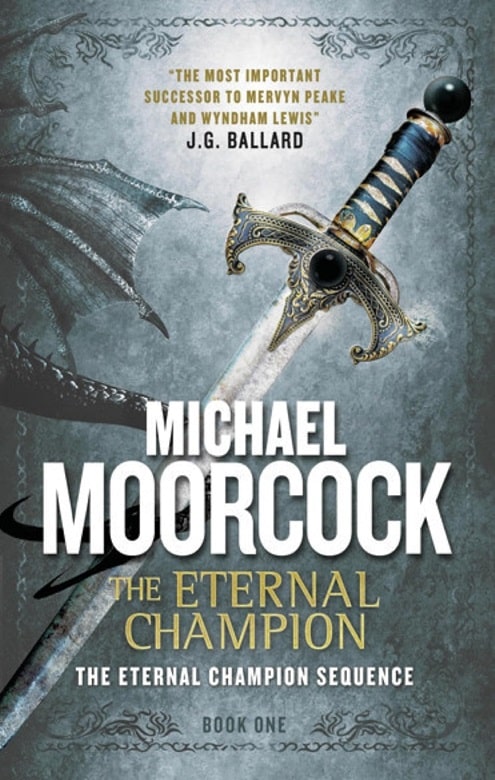
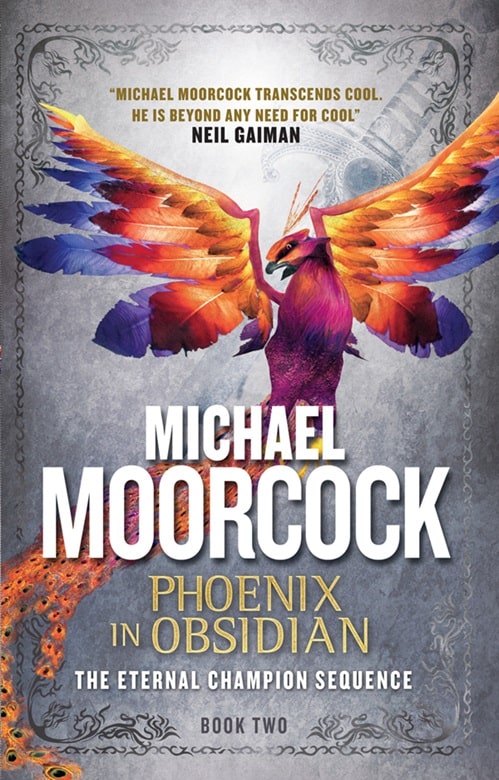
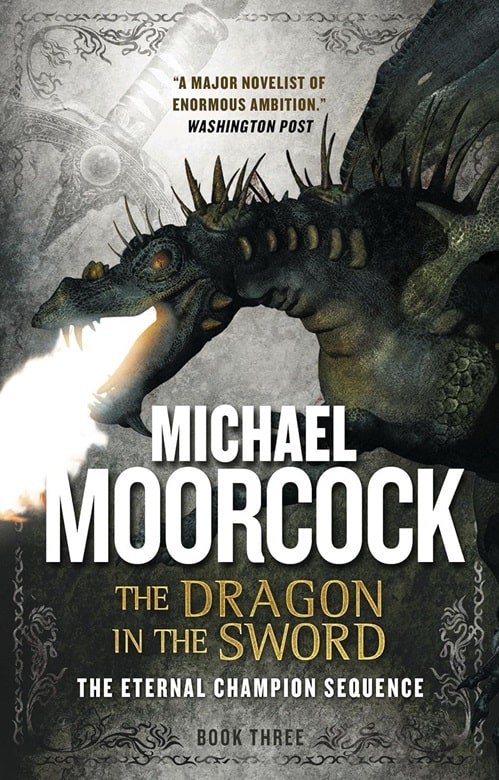
The Eternal Champion Sequence: The Eternal Champion, Phoenix in Obsidian, and
The Dragon in the Sword (Titan Books, November 2014). Covers uncredited
Like many readers, Bridger would return to the classic character time and again. Moorcock’s remarkable ability to churn out one story after another helped keep Elric current and fresh.
“In Elric, Moorcock took many of those qualities to extremes relative to typical fantasy heroes. His moods are darker. His weaknesses more debilitating. His impulses more consequential. His betrayals and revenges more bloody. And the stakes are higher, as he strives to save not just one world, but an entire multiverse of them,” Bridger shared.
He sees Elric’s legacy across the genre and beyond. And it is a legacy not just limited to books. His influence can be seen in video games, on tabletops, big and small screens.
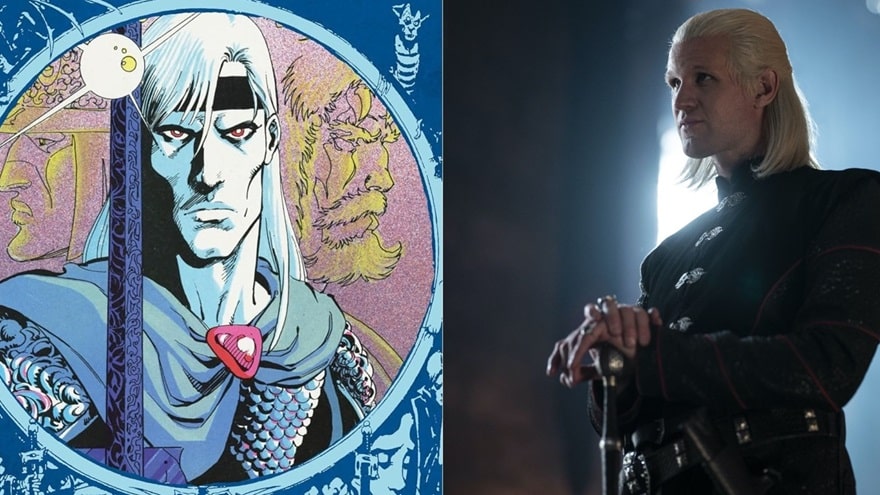 Elric and House of the Dragon‘s Daemon Targaryen. Art by Jan Duursema, from The Michael Moorcock Library Vol. 5: Elric The Vanishing Tower (Titan Comics, August 8, 2017). Daemon Targaryen photo by Ollie Upton.
Elric and House of the Dragon‘s Daemon Targaryen. Art by Jan Duursema, from The Michael Moorcock Library Vol. 5: Elric The Vanishing Tower (Titan Comics, August 8, 2017). Daemon Targaryen photo by Ollie Upton.
“There are some obvious parallels between Elric and later albino characters in fantasy fiction such as R.A. Salvatore’s drow elf Drizzt, Andrei Sapkowski’s Geralt the Witcher, and several members of George R.R. Martin’s Targaryen family tree, with their special abilities and complicated personalities,” Bridger detailed, explaining that the albino trope was itself borrowed from Sexton Blake’s Monsieur Zenith.
Roland Deschain of Stephen King’s Dark Tower series and Tyrion Lannister from A Song of Ice and Fire are two other characters that remind Bridger of the Eternal Champion. For Petrey, its Death from The Sandman that reminds him most of Elric. Both see the industry as being much richer due to the author’s influence.
“There’s an authenticity in Moorcock’s work. He himself is an iconoclast, he loves taking conventions and smashing them and I think that’s refreshing every once in awhile,” the professor stated.
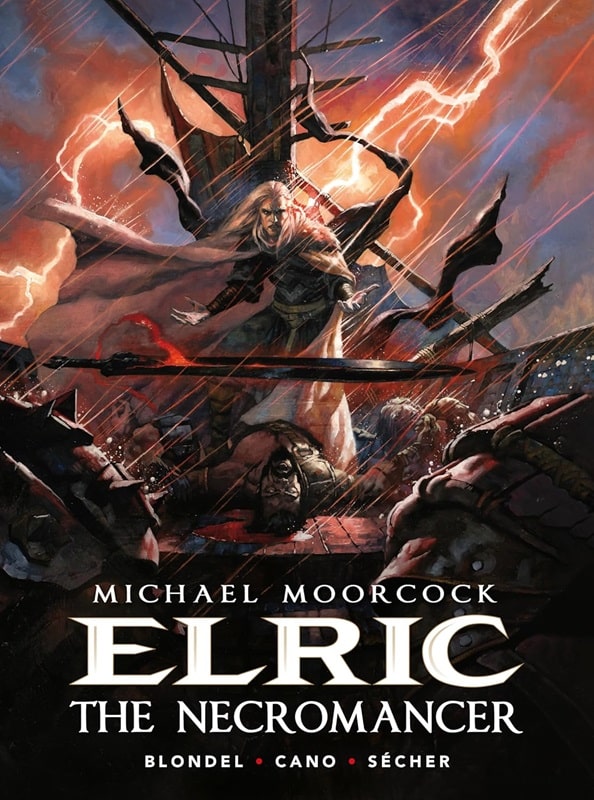 Michael Moorcock’s Elric Volume 5: The Necromancer, written by by Julien Blondel and illustrated by Valentin Sécher (Titan Comics, December 31, 2024).
Michael Moorcock’s Elric Volume 5: The Necromancer, written by by Julien Blondel and illustrated by Valentin Sécher (Titan Comics, December 31, 2024).
A six-decade run doesn’t happen by accident. If Elric proves anything, it’s that with the pale prince of ruins Moorcock was able to capture the magic that continues to enchant lovers of the genre.
“These are characters that have their own lives. I don’t want to be like Elric but his stories help me imagine what living that life, at that time, and in those societies would be like,” Petrey said.
The DNF Round-Up
As all readers know, sometimes a book just doesn’t click. Maybe it’s just not what you expected—or worse, maybe it’s just not working for you at all. Granted, it doesn’t happen to me too often, but when it does, that’s when DNF reviews come in. I’ve found that it greatly helps me process my reading experience to articulate why a book didn’t work for me, not to mention they also serve as a way to share my honest opinions with other readers who might feel the same—or who might actually enjoy the book for the very reasons I didn’t.
Here are the latest books that didn’t quite hit the mark for me and that I ultimately decided to put aside (a couple of these were actually from the tail end of last year).
I received review copies from the publisher(s). This does not affect the contents of my reviews and all opinions are my own.
 All the Hearts You Eat by Hailey Piper
All the Hearts You Eat by Hailey Piper
Mogsy’s Rating: DNF
Genre: Horror
Series: Stand Alone
Publisher: Titan Books (October 15, 2024)
Length: 447 pages
From the start, this one felt off to me. The prose was overly flowery and purple, making the writing feel bloated with unnecessary words. It’s tough to explain, but the intro felt simultaneously drawn out and all over the place. It was also hard to care about the characters, and by the time I set the book down about a quarter of the way into the book, they still didn’t feel fully realized. Any message on solidarity and friendship was completely overshadowed by the book’s aimless structure. Simply put: too many POVs, too much chaos, and too much pointless rage made this one impossible to continue.
 American Rapture by C.J. Leede
American Rapture by C.J. Leede
Mogsy’s Rating: DNF
Genre: Horror
Series: Stand Alone
Publisher: Nightfire (October 15, 2024)
Length: 384 pages
American Rapture had such an intriguing premise: as a new virus spreading across the country making the infected feral with lust, our protagonist braves the unknown to reunite with her family. Problem is, the author is not known for sublety. Really, she is not. Being over the top and shocking is part and parcel of the style and experience. But when you are dealing with such weighty topics like spiritual wounds, conflicted identities, and societal collapse, this treatment just feels so gratuitous and flippantly distasteful. This book didn’t feel like a story; the character felt more like Leede’s mouthpiece to deliver a one-sided and heavy-handed screed, and I abandoned ship early when I realized where things were headed.
 Water Moon by Samantha Sotto Yambao
Water Moon by Samantha Sotto Yambao
Mogsy’s Rating: DNF
Genre: Fantasy, Romance
Series: Stand Alone
Publisher: Del Rey (January 14, 2025)
Length: 384 pages
I really really wanted to like this book. That I didn’t DNF it until well after the 50% mark should tell you just how badly I tried, but ultimately it wasn’t to be. With all the comparisons to Studio Ghibli, I was originally all on board, but as any fan knows, their films are diverses in tone and not all of them resonate with everyone. Sadly, while Water Moon had the whimsy and mythological charm down pat, it fell short in the areas that matter most to me: character development and cohesive storytelling. Troubles began with the clunky and overwrought writing style, and further issues came to light when the plot made it more important to focus on the romance. It’s a shame because I wanted to be swept away by the magic but instead I was left disappointed, though Water Moon will undoubtedly be a favorite for many.
'The Five: The Untold Lives of the Women Killed by Jack the Ripper' by Hallie Rubenhold
Polly, Annie, Elizabeth, Catherine and Mary-Jane are famous for the same thing, though they never met.
They came from Fleet Street, Knightsbridge, Wolverhampton, Sweden and Wales. They wrote ballads, ran coffee houses, lived on country estates, they breathed ink-dust from printing presses and escaped people-traffickers.
What they had in common was the year of their murders: 1888.
Their murderer was never identified, but the name created for him by the press has become far more famous than any of these five women.
Now, in this devastating narrative of five lives, historian Hallie Rubenhold finally sets the record straight, and gives these women back their stories.
⦾
The Five: The Untold Lives of the Women Killed by Jack the Ripper by Hallie Rubenhold, read on audiobook by Louise Brealey.
“Poor women were expendable …”
I listened to the audiobook of this, via my library's BorrowBox app - even though I've also owned the B-format paperback since about 2020, I could just never bring myself (or my heart) to pick it up and read it of my own volition, but on audiobook I tore through it. And under the talent of Brealey's narration, who could bring out various regional accents to really help things along - it was superb.
This was such a tough listen but I’m really really glad that I finished this book and I found it to be an extraordinary non-fiction work and by far one of the best non-fiction books I’ve read in a long time.
I was completely upended, however to discover that this book has pissed off so many people and specifically “Ripperologists” to the point that Hallie Rubenhold has been horribly abused and harassed because she did to research into the canonical five victims of Jack the Ripper - and put fourth credible evidence that not all of them were prostitutes as the sick lore of this madman murdering spree dictated for so long.
Her book is a gracious and human examination of what it meant to be a woman in the 1880s and the impossible position that they were put in to either be Madonna or whore. She digs into the Victorian mindset of the time that insisted that their murders had to somehow be prescriptive to the wider public and so they were painted as Scarlet women. Their stories absolutely broke my heart and patterns did emerge in all of them — domestic violence, alcoholism (if only to have some alleviation from the drudgery of being a woman at the time) … the way people were kept impoverished and women in particular who had to bear the burden of childbirth and child rearing. Lack of education being the lightning rod overarching issue for so many people of this time. Just an incredible historical examination of everything never said about these women that I found to be so touching and crucial.
As I was reading, I was repeatedly struck by the realisation of how true it is now - just as it was in 1888 - that all it takes is a bad bout of luck, illness or injury for any one of us to experience houselessness and our fate to be completely undone. I thought that about each of these women at so many points in their life as Hallie unpicked them for us ... and my god, did my heart go out to them - across space and time.
The very final chapter in the book is the Author listing all of the items found on four of the victims upon their death; in one of their pockets was one red mitten — and that visual is just touching and heartbreaking, as was the entire book.
5/5
'The Ministry of Time' by Kaliane Bradley

From the BLURB:
A BOY MEETS A GIRL. THE PAST MEETS THE FUTURE. A FINGER MEETS A TRIGGER. THE BEGINNING MEETS THE END. ENGLAND IS FOREVER. ENGLAND MUST FALL.
In the near future, a disaffected civil servant is offered a lucrative job in a mysterious new government ministry gathering 'expats' from across history to test the limits of time-travel.
Her role is to work as a 'bridge': living with, assisting and monitoring the expat known as '1847' - Commander Graham Gore. As far as history is concerned, Commander Gore died on Sir John Franklin's doomed expedition to the Arctic, so he's a little disoriented to find himself alive and surrounded by outlandish concepts such as 'washing machine', 'Spotify' and 'the collapse of the British Empire'. With an appetite for discovery and a seven-a-day cigarette habit, he soon adjusts; and during a long, sultry summer he and his bridge move from awkwardness to genuine friendship, to something more.
But as the true shape of the project that brought them together begins to emerge, Gore and the bridge are forced to confront their past choices and imagined futures. Can love triumph over the structures and histories that have shaped them? And how do you defy history when history is living in your house?
'The Ministry of Time' is the debut novel from British-Cambodian writer and editor based in London, Kaliane Bradley.
So, this may well be my favourite book of 2024. WOW-ee. What an enjoyable read, especially for a low-science fiction girly whose particular proclivity is time-travel tales (those are always my fave 'Doctor Who' episodes, the back-in-time ones). So, some random observations;
⦿ I am very fond of 2005 YA novel 'The White Darkness' by Geraldine McCaughrean, which is about a teenage girl who is genuinely in love with (the long-dead) Captain Lawrence 'Titus' Oates from the doomed Terra Nova Expedition. So when I read the blurb for 'The Ministry of Time' about Britain having harnessed time-travel and successfully bought six travellers from various eras to the modern-day, including Commander Graham Gore from the doomed Franklin expedition - I was all in. *Especially* when the blurb hinted that Gore's present-day "bridge" - the protagonist of the novel who is tasked with helping him acclimatise and who maybe starts to develop feelings - I was *ALL IN*.

⦿ Time-travel has always been my bag. Modern-day women falling for out-of-time men is my particular favourite sub-genre ... I know exactly when this started; 'Playing Beatie Bow' by Ruth Park, and the time-travelling Abigail falling for Judah in the 1800's. This was particularly cemented when I read 'Outlander' by Diana Gabaldon as an 18-year-old; WWII army-nurse Claire passing through the stones to Jamie Fraser in the 18th century. No doubt there's some Marty McFly 'Back to the Future' Michael J. Fox appreciation thrown in there too. But this sub-genre of sci-fi and time-travel is my jamboree. And 'The Ministry of Time' gave it to me in HEAPINGS of timey-wimey goodness. The romance is slow-burn but makes up for it because our protagonist (whose name we don't know, but we get an intimate first-person account from) crushes HARD on Gore and that amps up the burn. But I was also very sucked into the mechanics and politics of the time-travel itself, so it wasn't like I was ever cooling my heels and checking my watch for the low sci-fi to get good ... it was ALL good.
⦿ The politics of time-travel in this book reminded me of the Norwegian sci-fi series 'Beforeigners', about people from different time-periods suddenly randomly appearing in Oslo, becoming refugees of time that the Norwegian government has to deal with. It's also a little bit like the (brilliant) Aussie TV series 'Glitch' set in a small outback town where; 'Seven people from different time-periods return from the dead with no memory and attempt to unveil what brought them to the grave in the first place.' I like this connection in particular because there's a shady organisation linked to the raising of the dead, a big-pharma laboratory called "Noregard" (best in-universe name for a corporation, ever.) It's also a wee bit like the 2001 rom-com starring Hugh Jackman and Meg Ryan, 'Kate & Leopold' about an English Duke from 1876 falling for a modern-day New Yorker when he's unceremoniously dragged into the future. If any/all of those recs are your picnic; this book is for you.

⦿ He filled the room like a horizon ... the writing was sumptuous, and gorgeous at times. Sometimes Bradley had a turn-of-phrase of description that made me go "ohhhhh." When something changes you constitutionally, you say: ‘the earth moved,’ but the earth stays the same. It’s your relationship with the ground that shifts.
⦿ I actually first heard about this book, in a Guardian round-up of British debuts to look out for, and the description of Kaliane Bradley's idea made my spine sizzle and then I Googled her even more and found that she partly wrote the idea for 'The Ministry of Time' during Covid and lockdowns and because she kinda fell in love with the only photograph of Graham Gore. No, really. 'Kaliane Bradley Fell in Love With a Dead Man. The Result Is The Ministry of Time' ... if that's not an *amazing* sales-pitch I don't know what is.

⦿ I just loved this. It's extremely cinematic and I wouldn't be surprised to find it is being developed into a movie or limited-TV series. It both feels appropriately head-nodding to plenty of other fabulous low-sci-fi time-travel that will make aficionados happy, but also sparkly-unique enough to keep adding to the conversation about the space-time continuum. Even if I guessed the small twist that comes, I did so because I know this sub-genre so well and expected certain markers along the way and Bradley did not disappoint. I loved this so much, I was only one-chapter in when I knew it'd give me the best bookish hangover and be hard book to follow-up, probably throwing me into a reading-rut.
5/5
'Love, Death & Other Scenes' by Nova Weetman

From the BLURB:
Nova Weetman’s unforgettable memoir reflects on experiences of love and loss from throughout her life, including: losing her beloved partner, playwright Aidan Fennessy, during the 2020 Covid lockdown; the death of her mother ten years earlier; her daughter turning eighteen and finishing school; and her own physical ageing. Using these events as a lens, Nova considers how various kinds of losses – and the complicated love they represent – change us and can become the catalysts for letting go.
This is a moving, honest account of farewelling a partner of twenty-five years, parenting teenagers through grief, buying property for the first time at the age of fifty, watching Aidan live on through his plays, and learning to appreciate spending hours alone with only the household cat for company. Warm and wise – and often joyful – Love, Death & Other Scenes ultimately focuses on the living we do after losses and what we learn from them.
At one point while reading Nova Weetman's memoir, I said out loud to the empty room; "Geez, you're good Nova."
Such was the power and force of certain sentences, ideas, inflections and offerings throughout. "As writers, we are stealers of other peoples memories, bowerbirds of story," she writes at one point - and then puts that ability to collect on full display throughout as she recounts the life she built with her partner, playwright Aidan Fennessy, who battled and then died from prostate cancer in 2020 during Melbourne's numerous lockdowns and waves of Covid.
I know Nova as a colleague, a fellow middle-grade author and someone I greatly admire, and whose books I truly - hand on heart - believe helped me in tapping into my own voice for this age group. I think it's a little odd that I feel like I know-her, *know* her now after reading 'Love, Death & Other Scenes,' though. And especially because I have a tangential understanding of the loss she and her two children experienced in 2020. My uncle died after his third bout of cancer - having beat the other two, it was pancreatic in the end, third time unlucky - and unlike Nova's partner who had the option but didn't use it; my uncle chose Voluntary Assisted Dying and went out on his own terms, at home, December 2020. We were all there. I'm both surprised and not at all by how much reading Nova's perspective of a death like that during Covid - which I watched my aunt and cousin go through, one of the helpers minding children and looking for ways to ease their pain - I needed to reexamine and feel.
But I'm also surprised at how beautifully romantic this book was too, as Nova writes about how she and Aidan first met - how she fell first, and pursued ... how so much of their relationship felt like it needed balancing, especially in their creative exchange; ‘He introduced me to albums I’d never heard, to singers dead before my time, and the way that songs stain your memories giving them meaning they don’t have in silence.'
In this too, I feel weirdly intimate to the story because Nova writes about Aidan's final play he ever wrote - 'The Heartbreak Choir' - finally being staged, but only after his death. His final work he never got to see fully-realised. It's because I know Nova and am a fan of hers, that I was aware through social media what she was going through - and when tickets became available for 'The Heartbreak Choir' debut performance in Melbourne, I snapped them up for both myself, my mum, and my aunt - also knowing that she in particular may find some comfort in both the story, and its background. And she did - we all did. I saw 'The Heartbreak Choir' in May 2022 and loved it! A play my Aunt still talks about, has triggered her love of theatre to the point that she and my mum will now spontaneously ask me to check out what's on and what's coming up, book something for us all.
'Love, Death & Other Scenes' feels like another chapter to that play, in a way. How apt, that Nova muses towards the end of her memoir; ‘And it is in words that I can find him,' and it's in both her words and his that I feel something being unlocked, and another story I want to share with my family. That I want to press this book into their hands and say; 'It's us, a little bit.' We're not so alone, I think.
5/5
'Unruly: A History of England's Kings and Queens' audiobook read by author, David Mitchell

From the BLURB:
A seriously FUNNY, seriously CLEVER history of our early kings and queens by one of our favourite comedians and cultural commentators.
This will be the most refreshing, entertaining history of England you'll have ever read.
Certainly, the funniest.
Because David Mitchell will explain how it is not all names, dates or ungraspable historical headwinds, but instead show how it's really just a bunch of random stuff that happened with a few lucky bastards ending up on top. Some of these bastards were quite strange, but they were in charge, so we quite literally lived, and often still live, by their rules.
It's a great story. And it's our story. If you want to know who we are in modern Britain, you need to read this book.
♛ ♛ ♛
This just *delighted* me and had me running to find any other audiobooks of David Mitchell's on my Library's BorrowBox app (and yes, I am forever disappointed when somebody says "David Mitchell" and means the bloke who wrote Cloud Atlas. I want 'Peep Show' David Mitchell, 'Upstart Crow' David Mitchell - and this book proves why!)
I listened to this while I walked the dog, and I must have looked like a King George III-level maniac laughing and guffawing as I picked up his poo (with a bag) and walked blithely along, nodding and laugh/crying ... but it was truly just *that* good!
David Mitchell's injections and rants are next-level (at one point he manages to tie in the absurdity of awards for art; like the year that the theme song for 'Shaft' was up against 'The Age of Not Believing' from 'Bedknobs and Broomsticks' for best song at the Oscars, to which he says you may as well compare a fish-finger to a ladder for all the good it does to categorise and quantify two pieces of art like that ... and he's not wrong!)
Mitchell only takes the book up to King James-ish because he says that was the last time that monarchy had true, absolute power before Parliament, Prime Ministers, foreign Governments and such started interfering with what the royals had bamboozled England into thinking was "divine rule," ... I do hope he decides to write a second-book about the waning royals (is it too much to ask that he give a full-throated debate on why a Republic would be better? Throughout the listening of this I could feel his tension to rein in what could have been an 11-hour long rant on the subject!)
As such, this was perhaps the most enjoyable new read I've encountered this year so far. Amazing!
5/5
'Witch of Wild Things' by Raquel Vasquez Gilliland

From the BLURB:
Legend goes that long ago a Flores woman offended the old gods, and their family was cursed as a result. Now, every woman born to the family has a touch of magic.
Sage Flores has been running from her family—and their “gifts”—ever since her younger sister Sky died. Eight years later, Sage reluctantly returns to her hometown. Like slipping into an old, comforting sweater, Sage takes back her job at Cranberry Rose Company and uses her ability to communicate with plants to discover unusual heritage specimens in the surrounding lands.
What should be a simple task is complicated by her partner in botany sleuthing: Tennessee Reyes. He broke her heart in high school, and she never fully recovered. Working together is reminding her of all their past tender, genuine moments—and new feelings for this mature sexy man are starting to take root in her heart.
With rare plants to find, a dead sister who keeps bringing her coffee, and another sister whose anger fills the sky with lightning, Sage doesn’t have time for romance. But being with Tenn is like standing in the middle of a field on the cusp of a summer thunderstorm—supercharged and inevitable.
I am a seasonal reader, and that’s a very hard thing to be in Melbourne at the moment where we’re swinging between heatwaves and downpours. So I find it interesting that in a bit of a reading slump, I randomly decided to reach for a witchy book that includes a character whose mood can change the weather …
This is my first read by Gilliland - and it’s her third book, but first adult romance. Her second YA book - ‘How Moon Fuentez Fell in Love with the Universe’ - won and was shortlisted for a slew of awards, and was already on my radar. But TikTok actually put me onto ‘Witch of Wild Things’ - about a Mexican woman who returns to her hometown where her dead sister haunts her, another curses her, and the boy who made her swoon over AOL until he broke her heart has grown into a hot man with forearm tattoos.
The fact that we come from dirt, and eventually turn to dirt, is spooky and incredible to think about it at the same time. My sister is dirt by now, surely. All of our ancestors are, too. This must make dirt holy, holy enough for the old gods to walk upon it from time to time. Holy enough that Nadia gives it a little cup of espresso to drink every single morning.I’m so glad I started with this book because it *hit the spot* - was lovely and spicy, but also made me weepy and tender-hearted. Our protagonist Sage has a particular story-arc about being the oldest sibling to her two sisters, and defaulting to a parental responsibility role that’s so rarely explored in fiction like this … imagine Luisa Madrigal’s ‘Surface Pressure’ song from ENCANTO, made into a novel.
It’s also very ‘Practical Magic’ by Alice Hoffman (BUT - it’s actually more of the 1998 Sandra Bullock/Nicole Kidman classic movie ‘Practical Magic,’ with its cottagecore-comfy and whimsy, whereas the book is … not? It’s darker. So if you prefer movie ‘Practical Magic’ then *this* is the book for you … not the actual Hoffman book, FYI and lol)
You can *kinda* tell that this book struggled to find a strong plot, however. And Gilliland hints at this in her acknowledgements, where she talks about a severe bout of writer's block from which this story was borne, from the scraps of an abandoned and unworkable idea. It does have a little bit of that feeling, like; she was immersed in this town and this family, the universe, and an actual strong through-line of story had to be somewhat shoehorned in.
So while I loved this - I maybe would have liked a few threads to be more deeply explored and wrapped up, and *maybe* it got slightly too easy by the end … but those are minor quibbles in an otherwise very sparkly and lovely book.
4/5
'Everyone and Everything' by Nadine J. Cohen

From the BLURB:
When Yael Silver’s world comes crashing down, she looks to the past for answers and finds solace in surprising places. An unconventional new friendship, a seaside safe space and an unsettling amount of dairy help her to heal, as she wrestles with her demons – and some truly terrible erotic literature.
Funny and tender, Everyone and Everything is about friendship, grief and the deep, frustrating bond between sisters. It asks what makes us who we are and what leads us onto ledges. Perfect for fans of Meg Mason, Nora Ephron and Victoria Hannan, this is an intimate, wry and wise exploration of one woman’s journey to the brink and back.
---
'Everyone and Everything' is the 2023 debut by Australian author, Nadine J. Cohen - from Pantera Press.
I've just come off an absolute roll with a certain type of new (millennial?) women's fiction. I've been calling it 'Fleabag'-esque. I don't like the term "well-dressed and distressed," for how some of the covers are often stylised - but I'd take "Women's Fiction with Bite." So I was in a bookshop the other day with a legit legend bookseller (Jaci from Hill of Content) who knows I have devoured 'Crushing' by Genevieve Novak, 'A Light in the Dark' by Allee Richards,' and 'Search History' by Amy Taylor ... when we were browsing the shelves and she just gently placed Nadine J. Cohen's debut into my hands and said; "Trust me," and reader - she was right.
This is the story of Yael Silver who joined the 'orphan's club,' far too young, and when the book begins has just made an unsuccessful attempt to end her life because of her latent grief over the deaths of both her parents and Nanna, an f-boy who emotionally wrecked and ghosted her and a general feeling like she's become a burden to her older sister, Liora.
Yael is on a long and slow pathway to recovery that largely begins in earnest when she starts regularly visiting the McIver's Ladies Baths in Coogee - perched on a cliff-face and offering her a scenic place to cry and read bad erotic fiction in peace. Until she meets older woman Shirley and they form an odd and healing friendship.
At one point Liora asks Yael; 'Is that what it's like in your head all the time?' after she shares another random and disturbing thought, to which Yael replies; 'Yup.' And this is essentially the book, too. Chapters are broken down by months spanning a whole year, but they're made up of almost vignette fragments; wisps of memory and tangents (sometimes deeply emotional, recounting her childhood or the lead-up and come-down of her Nanna, mother and father's deaths - other times pop-culture heavy; "Pacey Witter cures all ills.") It's all cogent, I must stress, and brilliantly done for reading like a patchwork of a healing mind, and the memory-squares amounting to so much insight as to who Yael is as a person. She's deeply funny and relatable (from Cher Horowitz praise to 'Gilmore Girls' marathons, she reads like a friend) but also very broken and fragile, and I found myself both smiling and crying in equal measure.
Jewish identity is also tenderly touched on in this book in a way that I really don't feel like I've read much in contemporary Australian fiction. Like how Yael looks back on her Nanna, mother and father's mental states at various times in their lives - how she retrospectively wonders what her grandparents being Holocaust survivors must have done to those lines of generational trauma;
I think about her often fraught relationship with mum, who, like all children of survivors, grew up with irrevocably damaged parents, and six million ghosts.
... and musing on how comfortable Jewish people are with death, compared to gentiles.
I absolutely adored this book. It wasn't easy, but it was beautifully wrought and Yael was a fine companion.
5/5
'Gwen and Art Are Not in Love' by Lex Croucher

Gwen, the quick-witted Princess of England, and Arthur, future lord and general gadabout, have been betrothed since birth. Unfortunately, the only thing they can agree on is that they hate each other.
When Gwen catches Art kissing a boy and Art discovers where Gwen hides her diary (complete with racy entries about Bridget Leclair, the kingdom's only female knight), they become reluctant allies. By pretending to fall for each other, their mutual protection will be assured.
But how long can they keep up the ruse? With Gwen growing closer to Bridget, and Art becoming unaccountably fond of Gabriel, Gwen's infuriatingly serious, bookish brother, the path to true love is looking far from straight …
'Gwen and Art Are Not in Love' by Lex Croucher is; "an outrageously entertaining take on the fake dating trope."
I know, I know - I am forever forgetting about my first bookish social platform love, my blog. I can't promise I'll be any better about updating on here in 2024, but I don't want to let the cobwebs entirely take over so I wanted to at least shout out a *little* something.
This 2023 YA historical queer title is my first Lex Croucher read, but it won't be my last by the British author because I absolutely fell head-over-heels in love with this book!
It exists in a post-King Arthur world, where the legend of Camelot and the Round Table still live on as myth and legend and the latest crop of teenage young royals are dealt the unfortunate blow of being politically and patriotically moulded into the second-coming of that once-great reign. Down to the political marriage alliance between princess Gwen and wealthy Lord, Arthur - who have been betrothed since childhood, and hated each other since then too.
Their feelings towards each other are particularly clouded because both are queer and develop feelings for others throughout the timeline of a tournament that Gwen's father has thrown to highlight the prosperity of new Camelot.
For Arthur, it's Gwen's brother and the next King of England - Gabriel - who perhaps feels the weight of Arthur Pendragon more than anyone. For Gwen, it's the only female knight competing, Bridget LeClair.
I cannot stress enough how much I loved this book; not least for the wide themes it addresses about weight of expectation, what history highlights and hides, and how much of courage takes fear.
'To be truly brave, first you must be afraid—and to be afraid, you must have something you cannot bear to lose.' There's also plenty in here about how cruel families can be, and how your chosen family can come to mean more and see you so much clearer than you see yourself;
‘You know … fathers aren’t always right, just by virtue of being fathers. Or even … just by virtue of being king.’
This was also a deeply, deeply funny book. One of my favourite character's was Arthur's steward, Sidney and the brotherly/jovial relationship they had with one another.
But hands-down, the romances are stand-out. I was swept up in Bridget and Gwen, Arthur and Gabriel and every heart-palpitating glance, kiss, up-against-a-wall make-out session ... all of it! I actually loved them all so much, I'd have been fully onboard had Croucher announced this as an ongoing series following the foursome as they stand to rule over a very new England.
Alas, she's moving on to another queering of a beloved myth next; Not for the Faint of Heart, a Robin Hood re-do! *squeeeeee*!

I can't wait!
5/5
YA Fantasy Audiobook Review: Daughter of the Moon Goddess by Sue Lynn Tan
 Daughter of The Moon Goddess ( The Celestial Kingdom #1)bought on Audible
Daughter of The Moon Goddess ( The Celestial Kingdom #1)bought on AudibleSynopsis from Goodreads
Growing up on the moon, Xingyin is accustomed to solitude, unaware that she is being hidden from the feared Celestial Emperor who exiled her mother for stealing his elixir of immortality. But when Xingyin’s magic flares and her existence is discovered, she is forced to flee her home, leaving her mother behind.
Alone, powerless, and afraid, she makes her way to the Celestial Kingdom, a land of wonder and secrets. Disguising her identity, she seizes an opportunity to learn alongside the emperor's son, mastering archery and magic, even as passion flames between her and the prince.
To save her mother, Xingyin embarks on a perilous quest, confronting legendary creatures and vicious enemies across the earth and skies. But when treachery looms and forbidden magic threatens the kingdom, she must challenge the ruthless Celestial Emperor for her dream—striking a dangerous bargain in which she is torn between losing all she loves or plunging the realm into chaos.
A captivating debut fantasy inspired by the legend of Chang'e, the Chinese moon goddess, in which a young woman’s quest to free her mother pits her against the most powerful immortal in the realm. Daughter of the Moon Goddess begins an enchanting, romantic duology which weaves ancient Chinese mythology into a sweeping adventure of immortals and magic—where love vies with honor, dreams are fraught with betrayal, and hope emerges triumphant.
8.5/10* * *
This turned out surprisingly good! I started the book rolling my eyes hard at sugary romance between the prince and his companion. Classic xinxia setup!
However, they both proved me wrong with their level of maturity. Basically, both ML and FL got over themselves pretty quickly and went on with their lives like adults.
The secondary romance developed so fast I must have blinked and missed its onset, but it definitely added tension and depth, especially when two men had to work together. * snort* Oh, the antagonism!
I'd say the action sequences were the most interesting and best written and I wished the author elaborated more about Xingyin's missions in the army as I was entertained the most with their descriptions.
Overall, a solid four star read. Will be checking out the next book in the series.
'Falco: The Complete BBC Radio Collection' by Lindsey Davis

From the BLURB:
Full-cast BBC Radio 4 dramatisations of the first five Falco novels by Lindsey Davis, starring Anton Lesser as Marcus Didius Falco.
The Silver Pigs:
One fine day, AD 70, Sosia Camillina quite literally runs into Marcus Didius Falco on the steps of the Forum. It seems Sosia is on the run from a couple of street toughs, and after a quick and dirty rescue, PI Falco wants to know why. Hoping for future favours from Sosia's powerful uncle, Falco embarks on an intricate case of smuggling, murder, and treason that reaches into the palace itself.
Shadows in Bronze:
Rome, AD 71. Against his better judgment, Marcus Didius Falco secretly disposes of a decayed corpse for the Emperor Vespasian, then heads for the beautiful Bay of Naples with his friend Petronius. But this will be no holiday: they have been sent to investigate the murderous members of a failed coup, now sunning themselves in luxurious villas and on fancy yachts in Neapolis, Capreae, and Pompeii.
Venus in Copper:
A small accounting error has left Marcus Didius Falco sharing a cell with a large rat. But the Roman Empire's most hard-done-by investigator is finally bailed out and promptly accepts a commission to help a family of freed slaves fend off a professional bribe....
The Iron Hand of Mars:
Falco is dispatched to one of the most hostile parts of the empire to deliver a new standard, an iron hand, to one of the legions. Germania is cold, wet, dismal and full of dark forests inhabited by bloodthirsty barbarians, but Falco has an even bigger problem to worry about: he has forgotten Helena Justina's birthday, and she is being pursued by the Emperor's son Titus Caesar.
Poseidon’s Gold:
Returning to Rome after his mission to Germania, Falco finds that his mother is being harassed by a centurion named Censorinus, who says he is chasing a debt owed to him by Falco's late brother, Festus. When Falco refuses to cough up the money, he and Censorinus end up fighting...and later, the centurion turns up dead. Under suspicion of murder, Falco must confront his past and uncover his brother's secrets before he can clear his name and solve the mystery.
These funny and fast-moving adaptations are a treat for all Falco fans.
***
Ahhhhh!!
Okay, I started listening to the first X5 'Marcus Didius Falco' books by Lindsey Davis, adapted for BBC radio (Dramatised by Mary Cutler, Directed by Peter Leslie Wild) because my library had them on the BorrowBox app.
I'd been vaguely aware of this series as a great recommendation of a Historical Crime - but given that they were first published in 1989 and there's currently 32-instalments across two series, it just seemed like a huge investment of time, money and resources .... step in local library and BorrowBox, not to mention how entertaining and *wonderful* this condensed BBC Radio Play was!
I think this series is absolutely brilliant; a gumshoe Roman-noir detective series set in AD-70 and featuring a wiry, jaded and sleazy 30-something ex-soldier who is somewhat scarred from his time fighting against the Boudica-uprising.
The first book in the series 'Silver Pigs' has Falco getting entangled with a Senator's family with a missing daughter whom Falco stumbled across and tried to help ... this has him becoming embroiled in a far great conspiracy scandal against the Roman Empire that Falco finds himself being hired to investigate (difficult, since he's also an avowed Republican - given he still has memories of Rome under psychotic Nero).
From the first book he meets the missing girl's cousin, Helena Justina - and she becomes his HEA and one-true-love throughout the rest of the series. I absolutely *love* this aspect, since I can only get invested in ongoing crime-series if there are relationships and romances established from the jump (hello, Karin Slaughter) and I rather love that Helena is far too good for Falco (and he knows it) but she sees and brings out the best in him, and the two spar and sizzle on the page.
Lindsey Davis does a marvellous job of bringing Rome to life and moulding her crime-of-the-week plot-lines around fascinating tidbits of Roman history; from their Legions to their love of art and culture, all within the seedy underbelly of Rome - the literal centre of the universe and first Empire. It has actually made me want to visit Italy for the first time, if only because the history Davis paints is so vivid I feel compelled to reach out and touch what's left of it ...
The BBC Radio Play truly is marvellous, and with a rich acting list;
Falco — Anton Lesser
Helena — Fritha Goodey/Anna Madeley
Petronius — Ben Crowe
Ma — Frances Jeater
Pa — Trevor Peacock
Vespasian— Michael Tudor Barnes
Titus —Jonathan Keeble
I cannot even begin to tell you how awks it is that I found Anton Lesser's voice to be so sexy in this (he who played Qyburn in 'Game of Thrones') and now that I'm getting deeper into Falco fandom, I also appreciate that many of them Fan-Cast Andrew Scott in the role, if it is ever adapted (and that is *spot-on*!)
I do know some fans were disappointed that to condense the books down to 2-4 hour radio-plays, much of Falco's interiority got cut for pacing - and that's apparently where he truly shines, and we see his cleverness and humour - so I am most looking forward to hunting down secondhand copies of ALLLLLLLL these books (R.I.P. my wallet) and getting stuck into a book-reading of the series to properly meet un-edited Falco. I might skim-read the first 5 books, just to make sure the BBC put me in good-standing and foundation for the rest of the series, but overall I'm just so grateful that they offered me a taster into this far-reaching and epic series and now I know for sure that it's right up my alley.
5/5

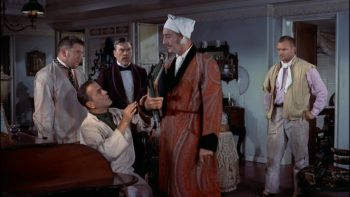
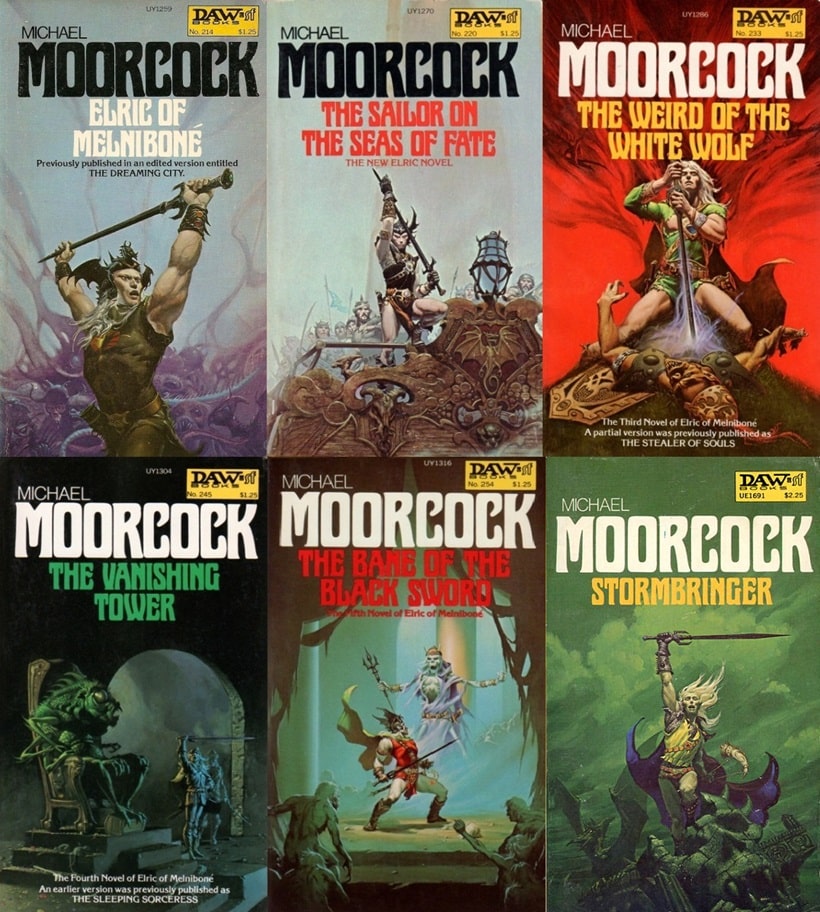

Recent comments